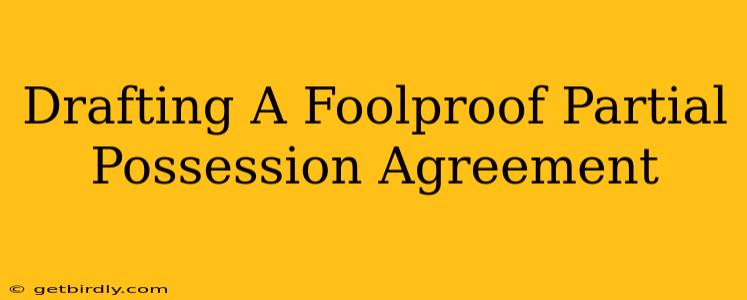Drafting a Foolproof Partial Possession Agreement: A Comprehensive Guide
A Partial Possession Agreement (PPA) is a crucial legal document that governs the handover of a property before its full construction or registration is complete. It outlines the terms and conditions under which a buyer takes partial possession, typically of an under-construction property. Drafting a foolproof PPA requires careful consideration of various legal and financial aspects to protect both the buyer and the seller. This guide offers a comprehensive overview of the essential elements to include, ensuring a legally sound and mutually beneficial agreement.
What is a Partial Possession Agreement?
A Partial Possession Agreement is a legally binding contract between a buyer and a seller, allowing the buyer to occupy a portion of the property before the complete project is finished and the final title is transferred. This is common in real estate, particularly with apartments or houses in under-construction projects. The agreement details the stages of construction, the payment schedule, possession timelines, responsibilities of both parties, and mechanisms for dispute resolution.
Key Elements of a Foolproof Partial Possession Agreement
A robust PPA should encompass the following critical elements:
1. Identification of Parties:
Clearly identify the buyer and seller with their complete legal names, addresses, and contact information. This section should leave no room for ambiguity.
2. Description of the Property:
Provide a precise description of the property, including its address, plot number, and any relevant survey numbers. Include details about the specific portion of the property the buyer is taking possession of. Attaching relevant documents like the approved building plan and layout is advisable.
3. Stage of Construction:
Specify the exact stage of construction at the time of partial possession. Clearly define what constitutes "partial possession" and what areas or amenities are accessible to the buyer.
4. Possession Date:
Clearly state the date on which the buyer can take partial possession. This should be realistic and aligned with the project's progress. Include penalties for delays.
5. Payment Schedule:
Detail the payment schedule, including the amount due upon signing the agreement, the installments linked to construction milestones, and the final payment upon complete possession. Specify the mode of payment and any applicable interest charges for late payments.
6. Completion Date:
Define the anticipated completion date for the entire project. This date should be realistic and backed by a reasonable construction timeline. Include clauses about potential delays and their impact on the agreement.
7. Liabilities and Responsibilities:
Clearly define the responsibilities of both parties. This includes the seller's responsibility for completing construction, maintaining the property until full possession, and addressing any defects. The buyer's responsibilities might include maintaining the portion under their possession and paying agreed-upon installments promptly.
8. Defects and Remedies:
Include a clause specifying the procedure for reporting and rectifying any defects or damages discovered after partial possession. This should outline the timeline for repairs and the consequences of the seller's failure to rectify the defects.
9. Insurance:
Specify who is responsible for insuring the property during the partial possession period. Usually, the seller maintains insurance until the final transfer of ownership.
10. Dispute Resolution:
Include a clause outlining the mechanism for resolving disputes, such as arbitration or litigation. This ensures a clear path for resolving any disagreements that may arise.
11. Governing Law and Jurisdiction:
Specify the governing law and jurisdiction for the agreement. This is essential for determining which legal system will govern any disputes.
Common Questions About Partial Possession Agreements
What happens if the construction is delayed?
Delays are a common concern. The PPA should include clauses specifying penalties for delays, potential extensions to the completion date, and mechanisms for renegotiating the terms if delays are significant and unavoidable.
What if there are defects in the construction?
The agreement should outline a clear process for reporting defects, timelines for rectification, and remedies available to the buyer if the defects are not addressed satisfactorily. This could include financial compensation or termination of the contract.
Can I back out of a PPA?
The possibility of backing out depends entirely on the terms laid out in the agreement. It's crucial to understand the conditions under which either party can terminate the contract. Penalties for breach of contract should be clearly defined.
What are the legal implications of a poorly drafted PPA?
A poorly drafted PPA can lead to significant disputes and financial losses for both parties. Ambiguities can be exploited, leading to costly litigation and delays in project completion.
Conclusion: The Importance of Legal Counsel
Drafting a foolproof Partial Possession Agreement is a complex legal matter. It's highly recommended to seek professional legal advice from a qualified real estate lawyer. A lawyer can help ensure the agreement protects your interests, is legally sound, and complies with all relevant laws and regulations. Don't underestimate the importance of having a robust and well-drafted PPA to safeguard your investment.

